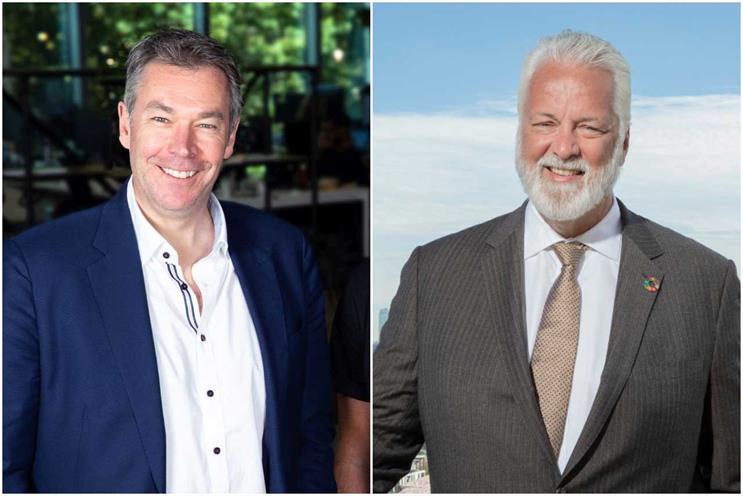
Euan Jarvie stared into the camera and delivered the message that every boss dreads having to deliver in the week before Christmas.
Hundreds of jobs could be at risk, Jarvie, chief executive of Dentsu Aegis Network in the UK & Ireland, told staff on Monday afternoon in a video webcast that was streamed to its head office in London and in the regions.
Around 9% of the group’s estimated 4,000 staff in the UK "may be impacted" in a restructuring, the company said.
That could hypothetically mean close to 400 people would be affected, although the company has insisted there are no firm numbers yet and has not identified any agencies that could be hit.
Some staff will lose their jobs, but other roles will be relocated from London to other parts of the UK.
Insiders describe the shift away from the capital as "near-shoring", rather than relying on "offshoring" in locations such as Bulgaria and India, where the group has operations.
But that corporate jargon underplays how Dentsu Aegis already has one of the strongest agency networks in the UK regions.
Close to 2,700 staff are in London, but upwards of 500 staff work in Manchester and 350 in Edinburgh, plus the group has offices in other cities including Bristol, Derby, Leeds and Newcastle.

In the near future, it is understood that more than half of Dentsu Aegis’ staff could be outside London.
There is uncertainty for now as a formal jobs consultation will not begin until after the Christmas break in January.
Several people describe the mood as "quite fearful" and "nervous". A big UK Christmas party didn't happen, unlike last year, although agencies did have their own parties. Travel has also been cut back.
The cull has not come as a surprise, because the UK operation has been under pressure for at least four years, but one company veteran cannot recall a previous consultation involving such a large number of UK staff, even during the 2008-2009 recession.
The timing of the announcement, just days before Christmas, was dictated by Japanese parent company Dentsu, which told investors in an unscheduled stock market announcement that it was slashing 11% of headcount in seven underperforming markets: Australia, Brazil, China, France, Germany, Singapore and the UK.
If 9% of UK headcount is potentially affected in a consultation (and some roles will be kept), that suggests some other markets will be worse hit. China, Australia and Brazil are expected to bear the brunt, according to analysts at JPMorgan.
The combined cuts will lead to a 3% reduction in Dentsu’s staff outside Japan – perhaps 1,200 out of 44,000, although the company won’t comment on such estimates.
Tim Andree, global chief executive of Dentsu Aegis, is also reorganising the group into three lines of business – creative, CRM and media – just six months after announcing five lines of business.
The restructuring – or "right-sizing", as some refer to it internally – will cost £179m.
Dentsu’s share price fell 6% as the group admitted profits will be lower than expected because of the international weakness.
The UK cuts have particular significance because London is the global headquarters of Dentsu Aegis and its historic base, since before Britain’s Aegis Group sold to Dentsu in 2012.
±±ľ©Čüłµpk10 looks at why the UK, one of Dentsu Aegis' top three markets, has been suffering and how it hopes to reorganise in its home market.
Leadership and client upheaval in the UK
Aegis Media, the media buying arm of Aegis Group, was one of the UK’s fastest-growing agency groups and it continued that record as Dentsu Aegis.
However, rapid growth under Jerry Buhlmann, the long-serving global chief executive until December 2018, also caused problems.

There was a succession of leaders of the UK operation – Rob Horler (2011-14), Tracy De Groose (2014-17), Stef Calcraft (2018) and Jarvie (from February 2019) – at a time when bigger rivals such as WPP’s Group M and Omnicom Media Group each had a long-serving boss in the local market.
Dentsu Aegis also made a huge number of acquisitions in new areas such as data, mobile and content, including agencies such as Merkle, Fetch and John Brown Publishing, which added complexity.
The UK operation began to struggle around 2016 and a significant number of local clients would go on to leave over the next two years.
These included media accounts for Asda, British Gas, BMW, GoCompare.com, TSB, 21st Century Fox and the UK government.
Dentsu Aegis’ media billings fell 9.2% to less than £1bn in 2018 compared with a year earlier, according to a Nielsen estimate for ±±ľ©Čüłµpk10’s School Reports.
The company moved Jarvie from a global client role to run the UK in early 2019 and his team has had some account wins, including Beiersdorf and Vodafone, but the UK operation remains under pressure, as Dentsu has acknowledged to investors this week.
The "media" part of the business is "at the heart of these pressures", according to Alex De Groote, who is a senior advisor to Trillium Partners, a boutique investment bank, and a long-standing media analyst.
"Aegis in the UK was historically a 20%-plus [margin] operating business," he says. "We suspect margins are contracting here. This reflects a combination of in-housing, more digital (which is less profitable), more procurement pressure and more competition from independents.
"Creative, likewise, is under intense pressure, though this may not be as relevant to Dentsu as other industry players."
Big, global clients paying low fees has been a particular issue, according to observers and insiders.
De Groote says: "We suspect Dentsu – like many agency groups – has tried to win new business internationally on price and then upsell with additional services and bells and whistles. This, however, has not worked."
Another person who works with Dentsu says: "The problem they’ve got is they’re making very little money on some of these big accounts. That’s not sustainable. The cuts they’re making are the legacy of a lack of change when it should have been made some time ago.
"A lot of clients are looking at in-housing – they’re looking at their entire businesses and how data-led decisions and automation are going to affect them, not just their marketing. Agencies need to be much more consultative – that means less implementational planning and buying."
A UK recovery strategy
Dentsu Aegis is optimistic that it can grow again in the UK and investing in new capabilities, including beefing up creative, is a priority.
Jarvie, who lives in his native Scotland, knows the UK regions well because he used to work at WPP’s MediaCom, where he was managing director of the Scotland and Ireland operations, and played a key role in building them up.
There is a logic to Dentsu Aegis moving more jobs from London to the regions at a time when other media businesses, from Channel 4 to WPP, are making similar moves.
It means the agencies can be closer to clients and reduce costs as other cities tend to be cheaper than the capital. Aberdeen is a centre for oil and gas clients, Cambridge for tech and robotics, and so on.
The UK political climate, with Brexit looming, also means the regions are becoming more important as centres of power.
Crucially, the cost of living in the regions is cheaper for talent compared with London.
However, it is understood that the group remains committed to move into a new headquarters in Euston, close to the current office in Regent’s Place, by 2022 – despite the pressure to cut costs.
There could be some challenges with the "near-shoring" strategy.
An industry observer points out big, international clients will generally look to hub work out of London because of its global links and they are less likely to want to use resources in the UK regions.
A source says such client-facing roles will stay in London, while back-office and finance work are more likely to be moved elsewhere.
Another person suggests some duplication of roles can be eliminated because Dentsu Aegis’ "south" and "north" UK businesses "have not been properly aligned".
The group is expected to continue its simplification drive in other ways – by axing more agency brands in the UK, after merging Fetch, 360i and ICUC to form Dentsu X, and moving a lot of the buying capabilities out of trading arm Amplifi and putting them back into Carat and Vizeum.
One client, which moved its UK account in the recent past from Dentsu Aegis, says: "Their challenge is they offer an integrated approach, which doesn’t always match reality. They have lots of silos – like iProspect and Vizeum and Merkle that function separately, not together."
Dentsu Aegis is already one of the big four agency groups in media buying in the UK, despite losing share recently because of client losses, and it is also one of the top players in CRM.
But it sees a lot of opportunity in creative where it has not traditionally been strong.
The group had just £22m worth of UK creative billings last year, according to Nielsen. By contrast, WPP, Publicis Groupe and Omnicom had more than £1bn each.
Dentsu Aegis thinks it is possible to have a top 10 UK creative agency within a couple of years, if it can acquire wisely.
In the short term, the key may be holding on to and recruiting senior media talent, after a wave of departures in the UK in the past 18 months.
Storm clouds over the agency sector
Dentsu has made two profit downgrades this year, after previously cutting its forecast in the summer, and most analysts were not taken aback by this week’s news.
By contrast, Publicis Groupe’s shock warning in October, when third-quarter revenue plunged 2.7%, spooked investors.
Still, JPMorgan estimates Dentsu could be facing a fourth-quarter revenue decline of nearly 4% – considerably worse than the 1% drop in the previous three months. The outlook for 2020 "does not look bright", the bank suggested.
Goldman Sachs and Bank of America Merrill Lynch both took a "positive" view of the restructuring.
Dentsu expects to save £100m a year from the job cuts and other efficiencies – something that De Groote points out is considerably less than the £275m that WPP is looking to save as part of its three-year turnaround, and it could indicate Dentsu Aegis' problems are less drastic.
"Weak organic revenue trends are not new news and remain common to all of the major agency groups," De Groote says. "Further profit warnings are to be expected from Publicis, but perhaps not WPP.
"In addition, we note profit warnings from the likes of smaller UK groups such as M&C Saatchi and Huntsworth. So the malaise is sector-wide.
"Paradoxically, areas of martech and adtech and the likes of [UK performance agency] Jellyfish are highly valued. I cannot recall such a wide spectrum of industry performance trends between the very good and very bad."
Those close to Dentsu Aegis point out 2019 was always going to be a year of preparation, ahead of the international and Japanese businesses coming together as "one Dentsu" in January 2020.
It is clear the new era is going to get off to a bumpy start in the UK.



.jpg)
.jpeg)

